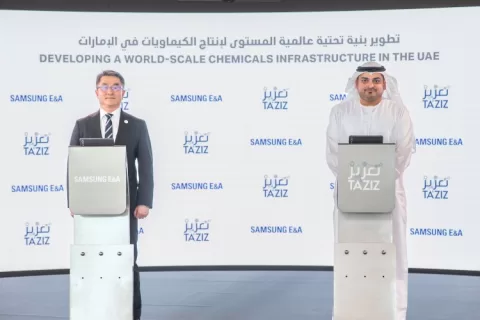Samsung E&A has been awarded a US$1.7 billion contract by Ta’ziz to construct one of the largest methanol plants in the world in Abu Dhabi. The company announced the contract for the 1.8 million tonne per annum plant earlier today and is “a significant step in realising Ta’ziz’s vision to drive the UAE’s industrial growth by creating a world-scale integrated chemicals ecosystem in Al Dhafra region” according to Mashal Al Kindi, chief executive of Ta’ziz. It will greatly improve the Emirates’ economic diversification by unlocking new domestic chemical value chains.
Also Read Etihad Rail Issues Tender for the Abu Dhabi-Dubai High-Speed Rail
Ta’ziz Methanol plant completion date
Samsung E&A aims to complete the methanol plant in the UAE by 2028. It will be powered by clean energy from the grid. This will make it one of the world’s most energy-efficient methanol plants. As methanol is is a clean burning fuel, it will produce fewer smog-causing emissions. Furthermore, it serves as an alternative to high-sulphur fuels used in marine transport. The chemical is among the most promising transition fuels. Methanol is great because it offers a cleaner alternative to common fuels used in power generation such as diesel and coal. What’s more, the plant will be the first methanol production facility in the United Arab Emirates.

Project overview
Location: Al Dhafra region, Abu Dhabi
Project cost: US$1.7 billion
Completion date: 2028
Contractor: Samsung E&A
Project Developer: Ta’ziz
More on Methanol production
“The plant will enhance the country’s position as a leader in sustainable chemicals production. Moreover, it will strengthen TA’ZIZ’s role in enabling ADNOC’s global ambition to lead the chemicals sector,” Al-Kindi added. The initial phase of the plant will see Ta’ziz produce 4.7 mtpa of chemicals by 2028. That includes methanol, polyvinyl chloride and low-carbon ammonia. Other chemicals include ethylene dichloride, vinyl chloride monomer and caustic soda. In the past ten years, methanol production has nearly doubled. Currently, around 98 million tonnes are produced a year according to a report from the International Renewable Energy Agency . Under current trends, production could rise to 500 million tonnes a year by 2050, it said.
Also Read Nigeria’s $3.3 Billion Mega Project: Brass Methanol Project

Leave a Reply